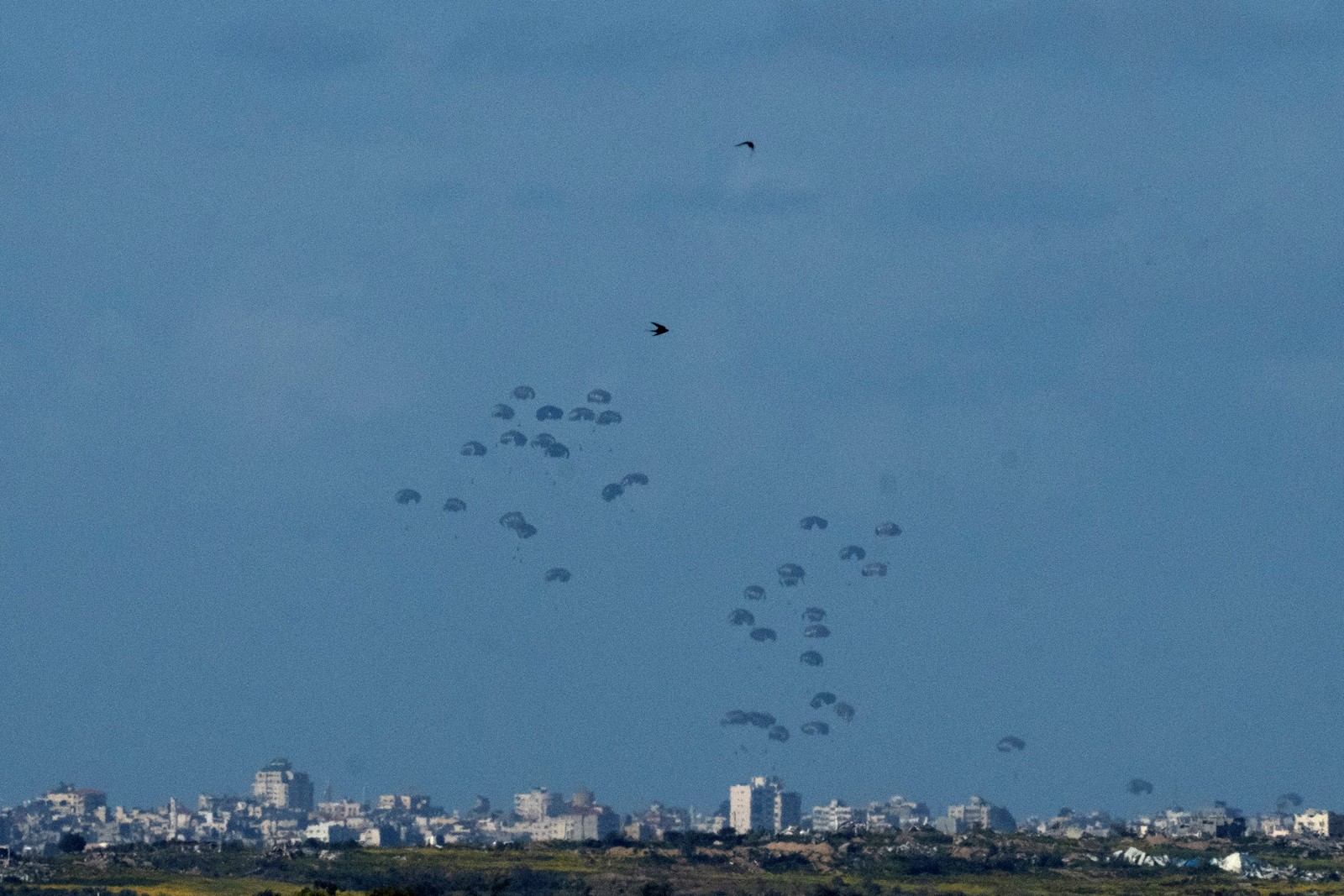
WASHINGTON>> The U.S. military will deploy to set up a temporary port off the coast of Gaza, the Biden administration said Thursday, joining in an international push to open a sea route delivering food and other aid to desperate Palestinian civilians cut off by the Hamas-Israel war and by Israeli restrictions on humanitarian access by land.
The announcement, signaling deepening U.S. involvement in the war and the escalating tensions and fighting in the region, comes as President Joe Biden comes under pressure to act more forcefully to ease what the U.N. says are near-famine conditions for many of Gaza’s 2.3 million people.
It also shows the administration resorting to an unusual workaround after months of appealing to Israel, the U.S.’s close ally and top recipient of military aid, to increase access and protection for trucks bearing humanitarian goods for Gaza.
Meanwhile, hopes for reaching a cease-fire before the Muslim holy month of Ramadan, which starts in the coming days, appeared Thursday to have stalled. Hamas said its delegation had left Cairo, where talks were being held. The outline for the cease-fire would have included a wide infusion of aid into Gaza.
A widening humanitarian crisis across Gaza during five months of war and tight Israeli control of aid trucks has left virtually the entire population desperately short of food, the U.N. says. Medical workers in northern Gaza this past week reported 15 children dead of starvation there, and said six other children were on the verge. In a meeting pressing Israel Ambassador Michael Herzog to provide access and security for more aid trucks, the U.S. international development director, Samantha Power, warned that blockaded Gaza “faced a real risk of famine,” her office said Thursday.
Israel accuses Hamas of commandeering some aid deliveries.
The U.S. officials said the planned operation will not require American troops on the ground to build the pier, which is intended to allow more shipments of food, medicine and other essential items from a port in the Mediterranean island country of Cyprus. They gave few other immediate details, including how many U.S. troops would take part.
The U.S. officials said it likely would take weeks before the pier is operational.
One of the options under consideration is for the military to provide a floating pier called a JLOTS, or Joint Logistics-Over-the-Shore, another U.S. official said. The large floating pier allows supplies to be delivered without having a fixed port in place, alleviating the need to have troops on a dock on shore. Ships can sail to the pier, which is secured by anchors, and dock there.
Defense Department spokesman Maj. Gen. Pat Ryder said in a statement Thursday that U.S. officials and international partners were looking at options, including using commercial companies and contractors to aid in the delivery.
Officials from the U.S., Europe, Israel and the Middle East have been deep in discussions and preparations on the possibility of opening a maritime sea route.
Cypriot President Nikos Christodoulides in November offered use of his country’s port in Larnaca for aid deliveries to the Palestinian enclave, a 230-mile journey from Cyprus.
European Union Commission Chief Ursula von der Leyen planned to visit Larnaca today to inspect installations.
Cyprus early on invited authorities from Israel, the U.S. and other European countries to join Cypriot agents in vetting all shipments so nothing could be used by Hamas against Israel.
Aid groups have said their efforts to deliver desperately needed supplies to Gaza have been badly hampered because of the difficulty of coordinating with the Israeli military, the ongoing hostilities and the breakdown of public order. It is even more difficult to get aid to the isolated north.
The United Arab Emirates also says it is working with its partners, including chef and humanitarian Jose Andres and his World Central Kitchen, to launch deliveries by sea, and is finishing details and timing.
Although land routes could be the most efficient way to get aid into Gaza, one of the senior U.S. administration officials said, Biden has directed that “we not wait for the Israelis” to get more humanitarian help in, more quickly.
Sigrid Kaag, the U.N. senior humanitarian and reconstruction coordinator for Gaza, told reporters late Thursday after briefing the U.N. Security Council behind closed doors that air and sea deliveries cannot substitute for expanding and diversifying supply routes on land, which remains “the optimal solution.”
The Biden administration’s latest move provides one more layer to the extraordinary dynamic that’s emerged as the United States has had to go around Israel, its main Mideast ally, and find ways to get aid into Gaza, including through airdrops that started last week.
Biden has been a crucial partner to Israeli Prime Minister Benjamin Netanyahu’s military offensive after Hamas’ Oct. 7 attacks in Israel. That includes providing bombs and other weapons to Israel and fending off efforts to censure Israel in the United Nations for the growing deaths among Gaza civilians.
But administration officials have grown frustrated at Netanyahu for seeming to shrug off much of the U.S. pressure for Israel to do more to reduce civilian deaths and to allow in humanitarian aid.
The World Food Program says an average of 99 aid trucks a day entered Gaza in February, one-fifth of what is needed.
“This is an expensive, inefficient workaround to a problem that has other ready solutions,” Brian Finucane, a former State Department official now with the International Crisis Group, said of the U.S. announcement on a temporary port and wartime sea route.


 PREVIOUS ARTICLE
PREVIOUS ARTICLE
